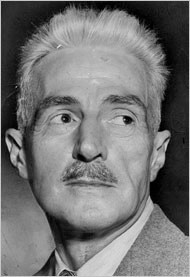
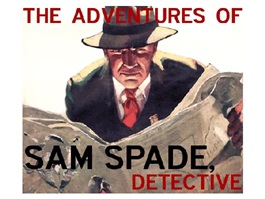 The Adventures of Sam Spade (1946-1951) aired “The Bail Bond Caper” on June 27, 1948 as its 92nd episode of approximately 243, only 74 of which are estimated to be still in circulation (this includes 12 AFRS repeats and 2 rehearsal shows). We have previously aired only six episodes of this show, the first in 2018, and the sixth in July of 2023. For newcomers, and as a refresher for long time listeners, we reprise the historical notes about the origins of Sam Spade as presented for background to that initial episode, with additional material added on the amazing Lurene Tuttle.
The Adventures of Sam Spade (1946-1951) aired “The Bail Bond Caper” on June 27, 1948 as its 92nd episode of approximately 243, only 74 of which are estimated to be still in circulation (this includes 12 AFRS repeats and 2 rehearsal shows). We have previously aired only six episodes of this show, the first in 2018, and the sixth in July of 2023. For newcomers, and as a refresher for long time listeners, we reprise the historical notes about the origins of Sam Spade as presented for background to that initial episode, with additional material added on the amazing Lurene Tuttle.
Sam Spade was the private detective and creation of Dashiell Hammett (1894-1961, photo top right). Based on Hammett’s time as a Pinkerton detective from people he knew or had heard about, Spade first appeared in the third of Hammett’s five novels, The Maltese Falcon, in 1930. Only three other stories, all short works, would feature Spade in magazines and all appeared in 1932. One final Spade story was published in 2013, over 50 years after his death in 1961. The Maltese Falcon was brought to film three times: 1931, 1936, and the now film noir classic of 1941 starring Humphrey Bogart, Peter Lorre, Mary Astor, and Sydney Greenstreet.
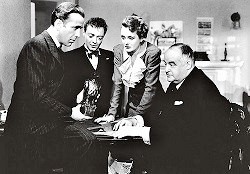
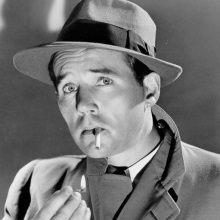 For all but its final radio season Howard Duff (1913-1990, photo at right) would star as Sam Spade and Lurene Tuttle would co-star as Spade’s secretary Effie Perrine. Duff would go on in later years to play various roles in quite a few films, and later with the advent of television would enjoy a lengthy career in many shows as star or character actor (drama and detective primarily) and was an easily recognizable presence on both the silver and small screens. Like Spade’s creator in the late 1940s (pre-HUAC, but Hammett failing to answer a Congressional Committee’s questions under oath stemming from his overt communist dealings), but years later and owing to a different set of circumstances, Duff found himself in the crosshairs of the early 1950s McCarthy-era House Unamerican Activities Committee (HUAC) and was labeled a communist subversive. It was at this point that this soft “blackballing” dovetailed with his burgeoning tv and film career that made it advantageous for him to leave the radio series, at which point Stephen Dunne would take over as the voice of Sam Spade for the series’s final 1950-51 season. According to the writeup by Radio Spirits on their 2014 calendar, on which Duff has the November slot: “A lot of talent came out of the Armed Forces Radio Service at the conclusion of the Second World War. One of the most outstanding examples was an energetic young sergeant named Howard Duff, born on November 24, 1913. A staff announcer for many AFRS features during the war, he was ready for the big time as soon as he doffed the uniform. It didn’t take long for him to land the role of a lifetime, bringing Dashiell Hammett’s legendary private eye Sam Spade to the microphone. In his four years in the role, Duff did the impossible–he replaced Humphrey Bogart’s film version as the definitive embodiment of the Hammett character: tough, yet vulnerable; hardboiled, yet with a sense of humor about his weekly predicaments. Among the legions of postwar radio detectives, Duff’s Spade stood out as one of the few truly originals.”
For all but its final radio season Howard Duff (1913-1990, photo at right) would star as Sam Spade and Lurene Tuttle would co-star as Spade’s secretary Effie Perrine. Duff would go on in later years to play various roles in quite a few films, and later with the advent of television would enjoy a lengthy career in many shows as star or character actor (drama and detective primarily) and was an easily recognizable presence on both the silver and small screens. Like Spade’s creator in the late 1940s (pre-HUAC, but Hammett failing to answer a Congressional Committee’s questions under oath stemming from his overt communist dealings), but years later and owing to a different set of circumstances, Duff found himself in the crosshairs of the early 1950s McCarthy-era House Unamerican Activities Committee (HUAC) and was labeled a communist subversive. It was at this point that this soft “blackballing” dovetailed with his burgeoning tv and film career that made it advantageous for him to leave the radio series, at which point Stephen Dunne would take over as the voice of Sam Spade for the series’s final 1950-51 season. According to the writeup by Radio Spirits on their 2014 calendar, on which Duff has the November slot: “A lot of talent came out of the Armed Forces Radio Service at the conclusion of the Second World War. One of the most outstanding examples was an energetic young sergeant named Howard Duff, born on November 24, 1913. A staff announcer for many AFRS features during the war, he was ready for the big time as soon as he doffed the uniform. It didn’t take long for him to land the role of a lifetime, bringing Dashiell Hammett’s legendary private eye Sam Spade to the microphone. In his four years in the role, Duff did the impossible–he replaced Humphrey Bogart’s film version as the definitive embodiment of the Hammett character: tough, yet vulnerable; hardboiled, yet with a sense of humor about his weekly predicaments. Among the legions of postwar radio detectives, Duff’s Spade stood out as one of the few truly originals.”
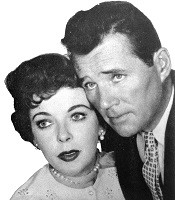 Duff would marry one of the most respected and groundbreaking women actors and directors in film history in 1951, Ida Lupino (1918-1995, Lupino & Duff photo at right). The two would star together in several films throughout the 1950s. As to Duff’s film and television appearances, they are too numerous to mention all of them here, though a sampling may recall him to many a fan of the films and TV shows in which he appeared: Films–The Naked City (1948), While the City Sleeps (1956, with Ida Lupino), and Kramer vs. Kramer (1979); Television–The Rockford Files, The Golden Girls, Knots Landing, Dallas, as “Capt.” Thomas Magnum, II–grandfather of Thomas Magnum starring Tom Selleck on Magnum, P.I. His genre credits include an episode of The Twilight Zone and Batman (“The Entrancing Dr. Cassandra” with Ida Lupino).
Duff would marry one of the most respected and groundbreaking women actors and directors in film history in 1951, Ida Lupino (1918-1995, Lupino & Duff photo at right). The two would star together in several films throughout the 1950s. As to Duff’s film and television appearances, they are too numerous to mention all of them here, though a sampling may recall him to many a fan of the films and TV shows in which he appeared: Films–The Naked City (1948), While the City Sleeps (1956, with Ida Lupino), and Kramer vs. Kramer (1979); Television–The Rockford Files, The Golden Girls, Knots Landing, Dallas, as “Capt.” Thomas Magnum, II–grandfather of Thomas Magnum starring Tom Selleck on Magnum, P.I. His genre credits include an episode of The Twilight Zone and Batman (“The Entrancing Dr. Cassandra” with Ida Lupino).
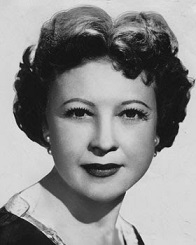
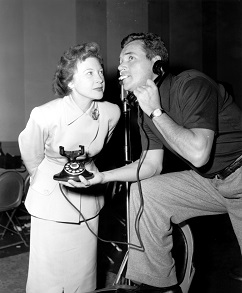 Lurene Tuttle (1907-1986) was known as “The First Lady of Radio,” sometimes appearing in 15 different shows a week. Dragnet, The Whistler, Lux Radio Theater, Suspense, and The Great Gildersleeve were but a scant few of the many shows she would appear in over the years. One of her most memorable roles was as Sam Spade’s secretary Effie Perrine. She also played virtually every other female character on the show as well, a tribute to her immense talent and versatility. She transitioned from vaudeville to radio, and from radio to film and television, appearing in some 50 films (credited and uncredited), and dozens and dozens of television programs, a few of which were Leave it to Beaver, The Andy Griffith Show, Fantasy Island, Dennis the Menace, Little House on the Prairie, Bonanza, Gunsmoke, and I Dream of Jeannie. Lurene Tuttle was honored with two stars on the Hollywood Walk of Fame, one for radio and one for television. She died of cancer on May 28, 1986 in a hospital in Encino, California. Long time Sam Spade co-star Howard Duff delivered her eulogy.
Lurene Tuttle (1907-1986) was known as “The First Lady of Radio,” sometimes appearing in 15 different shows a week. Dragnet, The Whistler, Lux Radio Theater, Suspense, and The Great Gildersleeve were but a scant few of the many shows she would appear in over the years. One of her most memorable roles was as Sam Spade’s secretary Effie Perrine. She also played virtually every other female character on the show as well, a tribute to her immense talent and versatility. She transitioned from vaudeville to radio, and from radio to film and television, appearing in some 50 films (credited and uncredited), and dozens and dozens of television programs, a few of which were Leave it to Beaver, The Andy Griffith Show, Fantasy Island, Dennis the Menace, Little House on the Prairie, Bonanza, Gunsmoke, and I Dream of Jeannie. Lurene Tuttle was honored with two stars on the Hollywood Walk of Fame, one for radio and one for television. She died of cancer on May 28, 1986 in a hospital in Encino, California. Long time Sam Spade co-star Howard Duff delivered her eulogy.
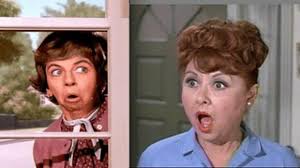 Though Lurene Tuttle made the role of Effie Perrine hers, both took off now and again for brief vacations. This episode features Sandra Gould (1916-1999, photo at right with Alice Pearce left, and Gould right) as Effie’s replacement while she is (in the script and in real life) on vacation. Gould is probably best remembered as Gladys Kravitz on the television sitcom Bewitched, the nosey neighbor always trying to catch Samantha performing some act of magic. She replaced the original Gladys Kravitz when her friend Alice Pearce died of cancer during season 2. Gould would play the role from then through season 7. She would also play Gladys Kravitz in the spinoff Tabitha, and would have roles in a handful of other TV shows over the years, among them Columbo, Adam 12, The Brady Bunch, and Friends. Sandra Gould passed away from a stroke following heart surgery, three days before her 83rd birthday.
Though Lurene Tuttle made the role of Effie Perrine hers, both took off now and again for brief vacations. This episode features Sandra Gould (1916-1999, photo at right with Alice Pearce left, and Gould right) as Effie’s replacement while she is (in the script and in real life) on vacation. Gould is probably best remembered as Gladys Kravitz on the television sitcom Bewitched, the nosey neighbor always trying to catch Samantha performing some act of magic. She replaced the original Gladys Kravitz when her friend Alice Pearce died of cancer during season 2. Gould would play the role from then through season 7. She would also play Gladys Kravitz in the spinoff Tabitha, and would have roles in a handful of other TV shows over the years, among them Columbo, Adam 12, The Brady Bunch, and Friends. Sandra Gould passed away from a stroke following heart surgery, three days before her 83rd birthday.
This episode turned out to be a welcome surprise. After listening to it my first reaction was that it was a fine example of the noir sub-genre of the detective story, well written and hitting all of its marks on cue. But upon reflection my thoughts turned to one of, if not the, greatest example of film noir every made, 1947’s brilliant Out of the Past. It starred Robert Mitchum as a former investigator who had left that life behind him and had begun an above board life in a small town, seeking only anonymity and the peace he hoped it would bring him, only to be found and once again entangled in deadly mischief involving a shady, big city gambler (played by Kirk Douglas in only his third film role), and a murderous femme fatale played to the hilt by the beautiful Jane Greer. Though the storylines diverge greatly in these two examples, one being a feature length film with all the power and nuance the medium can bring to the large screen, and the other is but a half hour radio drama, both are effective and their creators are to be commended for adapting their stories to their respective mediums. “The Bail Bond Caper” has its own femme fatale with the beautiful woman who enters Sam Spade’s office seeking his help at the very beginning. She is a paramour of Sam’s from years ago and he hardly recognizes her until she “slithers from her mink.” Her story is that she is now married to an ex-con who has done his time and has left his life of crime behind and now seeks to live on the right side of the law with gainful employment as a bail-bondsman. But his beautiful wife has reason to believe that he is being drawn back into his criminal past from an outside source, and desperately wants Sam to investigate, to help her husband overcome whatever–or whomever–is trying to force him back into a life he has thus far successfully buried. During his investigation Sam encounters elements of the mob, who and why his former lover’s husband has been contacted, the hidden motives of several ne’er-do-wells, and of course the plot is thickened and stirred by the obligatory corpse count. Both the film and this radio dramatization include investigators (though in different roles), a source from out of the past dragging back characters who are in the process of redeeming themselves from former lives, and femme fatales, and while our sexy love interest from out of Sam’s past can’t hold a candle to the serial murderer played by Jane Greer in Out of the Past, she is definitely no Snow White. It has been said that “Originality is the Art of Concealing One’s Source.” While I don’t believe the author of this timely radio script is consciously trying to conceal the inspiration for his creation, it is worth noting that “The Bail Bond Caper” aired in June of 1948, a scarce 7 months since Out of the Past was released to wide critical and popular acclaim in November of 1947.
Of interest to genre supernatural horror fans is that Jacques Tourneur not only directed Out of the Past, but the classic b&w (very noirishly filmed) Cat People in 1942.
Play Time: 29:36
{Broadcast on a Sunday evening in late June of 1948, the neighborhood gang would of course head for the nearby newsstand the next morning, hoping to score a few magazines featuring more hard-hitting detective stories in the vein of the Sam Spade thriller they had listened to the night before. Black Mask (1920-51) was the unquestioned king of the detective pulps and so was an obvious choice. It held to its bi-monthly schedule in 1948. New Detective (1941-53) proffered the newest in crime fiction for its readership while emphasizing the police detective in its action-packed stories. It also was a bi-monthly in 1948. 10-Story Detective (1938-49) laid the groundwork for titles like New Detective in that it also focused on the police detective and proved it an effective formula some three years prior to the debut of New Detective. 10-Story Detective, like the others the gang chose that Monday morning, was a bi-monthly.}
[Left: Black Mask, 5/48 – Center: New Detective, 7/48 – Right: 10-Story Detective, 6/48]
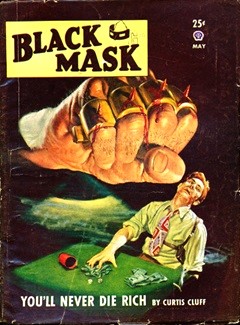
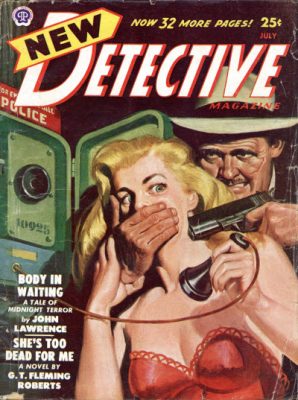
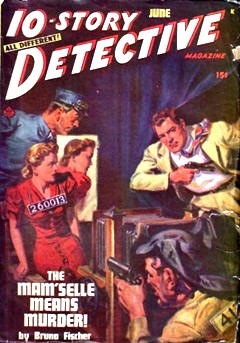
To view the entire list of Old Time Radio episodes at Tangent Online, click here.